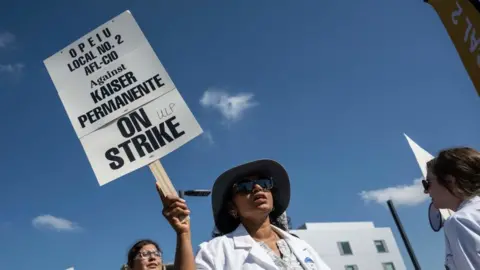Kaiser Permanente: Over 75,000 US healthcare workers go on strike
 Getty Images
Getty ImagesOver 75,000 union workers at healthcare provider Kaiser Permanente have gone on strike, beginning the largest walkout by health workers in US history.
The three-day work stoppage involves nurses, pharmacists and lab technicians in five US states and Washington DC.
Nearly 13 million patients could be impacted by the strike, which follows stalled contract negotiations between the unions and Kaiser Permanente.
Hospitals and emergency facilities will remain open throughout the strike.
A previous labour agreement between the eight unions in the coalition and the company expired on 30 September,
Through the strike, the Coalition of Kaiser Permanente Unions hopes to pressure the California-based company to address staffing shortages that began during the Covid-19 pandemic in 2020, as well as better wages.
In a statement on Wednesday, Kaiser Permanente said that it had made "a lot of progress" in discussions with the unions overnight and "remained committed to reaching a new agreement".
The strike's greatest impact will be felt in California, Oregon, Colorado and Washington state, where hundreds of medical support staff will strike for three-days.
While Kaiser Permanente has said that hospitals and emergency departments will continue to function - partly staffed by "contingent workers" - non-essential services such as routine check-ups or elective procedures may have to be rescheduled.
In Virginia and Washington DC, a smaller total of approximately 400 pharmacists and optometrists, planned to stop work for a day. Kaiser Permanente has expanded its network of pharmacies to ensure access to medicines if outpatient pharmacies close during the strike action.
The unions have repeatedly pointed to Kaiser Permanente's profits - which reached about $3bn (£2.47bn) in the first half of this year - as a sign that contracts should be renegotiated. In a July statement, the coalition also claimed that the firm's CEO makes $16m (£13.18m) a year, with 49 executives earning over $1m (£820,000).
Caroline Lucas, the executive director of the Coalition of Kaiser Permanente Unions told BBC News that executives' inaction over the last six month have led to treatment delays
"These kinds of conditions mean that things that could be preventable and caught in time become crises," she said, adding that the company refused to "listen to frontline health care workers".
"Our frontline health care workers had no choice but to escalate that issue outside of the hospitals."
Michael Ramey, an ultrasound technician at a Kaiser Permanente facility in San Diego, told the BBC's US partner CBS that his job had become "heartbreaking" and "stressful" as a result of chronic staffing issues.
"You don't have the ability to care for patients in the manner they deserve," said Mr Ramey, the head of his local union.
"We are willing to do whatever it takes to ensure we have a contract in place that allows us to be staffed at the levels where we need to be".
The Kaiser Permanente strike is one of several high-profile labour actions that have taken swept across the US this year, including ongoing strikes by the United Auto Workers and the Screen Actors Guild-American Federation of Television and Radio Artists.
US Bureau of Labour statistics show that more than 309,000 workers went on strike through August this year alone.
